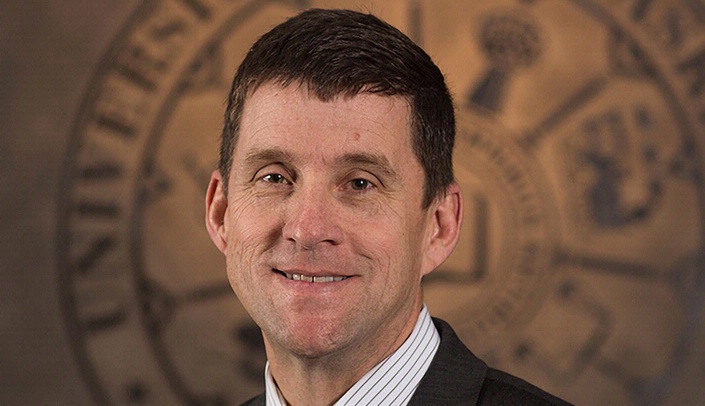University of Nebraska President Hank Bounds, Ph.D., on Tuesday was joined by some of the state’s most prominent business leaders, including the president of the Nebraska Chamber of Commerce and the CEO of a Fortune 500 company, in testifying for a major investment in student scholarships to retain more top talent and grow Nebraska’s workforce.
Dr. Bounds, Nebraska Chamber of Commerce and Industry President Bryan Slone, Mutual of Omaha Chairman and CEO James Blackledge, Nelnet Executive Chairman of the Board Mike Dunlap, Lincoln Chamber of Commerce Executive Vice President Bruce Bohrer, and Millard Public Schools Superintendent Jim Sutfin were among the supporters of LB639, the H3 Careers Scholarship Act.
The bill, introduced by Sen. John Stinner of Scottsbluff and Sen. Lou Ann Linehan of Elkhorn, would provide $10 million in 2019-20, $20 million in 2020-21 and $30 million annually thereafter for scholarships in high-skill, high-demand, high-wage (H3) areas as determined by Nebraska’s Department of Labor. Current examples include nursing, engineering, software development and accounting — all key to Nebraska’s long-term economic growth. More than two-thirds of the state’s 35,000 projected H3 openings will require an associate’s degree or higher.
But, Dr. Bounds and others pointed out in testimony to the Legislature’s Education Committee, Nebraska isn’t currently producing the workforce to meet those needs. Nebraska will have 1,500 openings for registered nurses in the decade ahead, for example, 1,000 openings for accountants and auditors, and almost 400 openings for engineers.
Additional scholarship support would make Nebraska more competitive in keeping the best and brightest talent in the state, Dr. Bounds said. He noted that on a per-population basis, Nebraska ranks in the bottom 10 nationally in the amount of state grant aid provided.
“Nebraska’s sons and daughters deserve opportunities to stay here,” he said.
“The fact is that in every community I visit, Nebraskans tell me the same thing: Our No. 1 need is workforce, our No. 2 need is workforce and our No. 3 need is workforce. . . As a state, we need to take quick and meaningful action to solve the crisis.”
Dr. Bounds praised Sens. Stinner and Linehan for their leadership in the conversation about Nebraska’s future.
“These are the kinds of ideas we need to be talking about as we think about what we want Nebraska to look like 10, 20 and 30 years down the road,” he said.
Sen. Stinner said: “Workforce and talent development is becoming an arms race that Nebraska cannot afford to lose. States that get workforce and talent development ‘right’ will outpace Nebraska in terms of growth, creation of good-paying jobs, and economic prosperity.”
Slone, from the Chamber of Commerce, called workforce development the single biggest challenge facing the state.
“There will be a 50-state competition for workforce,” he said. “There will be winners and losers.”
Mutual of Omaha’s Blackledge said: “Businesses will go wherever the talent is. The implications of our continuing to lose a significant number of our best and brightest to other states are profound, lasting and perhaps irreversible.
“(Mutual of Omaha’s) demand for technology talent, and that of other companies in our state, cannot be met without strategic initiatives such as LB639 aimed at developing and retaining a talented workforce in Nebraska.”
Under LB639, the Department of Labor would determine H3 occupations and majors leading to H3 careers. Students would have to be Nebraska residents attending one of the state’s public postsecondary institutions to be eligible for a scholarship. They would be required to maintain a 3.0 grade point average and complete an internship with a Nebraska business prior to graduation.
Higher education institutions would have to match every $3 from the state with $7 in institutional funds.
The Education Committee will now determine whether to advance the bill to the full Legislature for debate.
